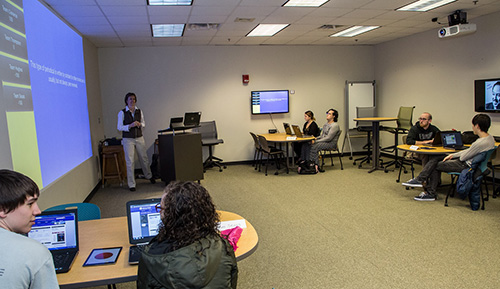Library Instruction

Group Instruction
Librarians are happy to meet with classes and to offer instruction in how to use the library and its many resources. Each instructional session is tailored to the specifics of the course and its assignments.
Librarians are able to provide both face-to-face and virtual instruction. Virtual instruction is available via Zoom (click HERE to connect to the Zoom campus Information Technology page).
Librarians can also create a library research guide (LibGuide) that lists useful sources for students to consult that will remain accessible throughout the semester (Click HERE and select the down arrow to the right of "By Course..." to see examples).
Librarians can be "embedded" in Canvas throughout the semester and provide online assistance to students at their point of need. Librarians can also create short video tutorials using a variety of tools.
If you wish to set up either a face-to-face or online session for your class, you may select from one of the following options:
Please note:
-
We try our best to tailor our library sessions to your particular classes. You can help us do so by providing us with information about the student assignment(s), including some specific sample topics and any stipulation pertaining to the sources that you wish your students to use.
-
We highly recommend that you request your library session for a time when students already have a fairly good idea about the topics that they will be working on. Students will perceive library sessions as more meaningful if they see the connection to their project.
-
We offer three major formats:
-
Single lecture/demo session either face-to-face or online.
-
Lecture/demo session followed by a hands-on practice session (either back-to-back or on different days). Like face-to-face session, online instruction can contain time for students to research and ask a librarian questions.
- Library instruction with more involved collaboration between librarian and course instructor, including the selection of suitable information literacy learning outcomes, the development of an assessment rubric, and the sharing and discussion of the assessment data.
-
While usually requiring additional time, the combination of lecture and hands-on seems to be most effective. Typically, it is during the hands-on phase that students become lively and seek a dialog with both the class instructor and the librarian.
- We have a number of instruction spaces in the library but are glad to come to your class or hold the session online.
-
We ask instructors to be present during the sessions we teach for two reasons. First, our electronic resources are in a constant state of flux; this is a good opportunity for instructors to catch up with the resources that they want their students to use. Second, if questions about the assignment and the resources to be used emerge, the class instructor can respond to these right then and there.
-
Finally, we ask instructors to be cautious when excusing students from library sessions. Students often do not realize that our library sessions are tailored to specific courses/assignments and that access to the online resources may have changed.
Courses
Library Resources 101 (LRES 101)
Library Resources 101 is an introductory course titled Information Literacy Skills for College-Level Research. The purpose of this course is to teach students how to become proficient and discerning in using print, electronic, and other library resources to obtain relevant information. This is a graded, one-credit course. For more information, please visit the Library Resources 101 page or contact Dave Dettman
Library Resources 150 -- Critical Approaches to Information Research (LRES 150)
Effective use of information resources and services in a variety of academic disciplines and professions. Topics include information cycle and timeline; comparing, contrasting, and selecting information resources; types and characteristics of information sources; effective information research planning; search techniques, evaluation criteria, disinformation, and ethical use of information. This is a graded three-credit course. For more information, please visit the Library Resources 150 page or contact Dave Dettman
Library Resources 380 (LRES 380)
Supervised field experience in UWSP libraries or archives. LRES 380 is titled: Internship in Academic Librarianship, and is 1-3 credits. For more information, please visit the Library Resources 380 page or contact Dave Dettman for more information. For information regarding the internship with an emphasis on the University Libraries Archives contact University Archivist Kyle Neill.
Other Library Instruction
The Library also provides instruction in several other ways.
-
We assist and instruct our users with library research questions through our reference services.
-
We offer one-on-one sessions to newly hired faculty.
-
We offer one-on-one sessions to UWSP faculty, staff, and students working on advanced projects. If you wish to schedule such a session, please contact a librarian to make an appointment.
-
Periodically, we offer open sessions introducing new tools and resources. These sessions will be announced on our homepage and through the UWSP Message of the Day.
-
Upon request, we provide sessions on specific library resources to community organizations. If you wish to schedule such a session, please contact the Library Instruction Program Coordinator.
If you have any questions, please contact the Library Instruction Program Coordinator at ddettman@uwsp.edu.
